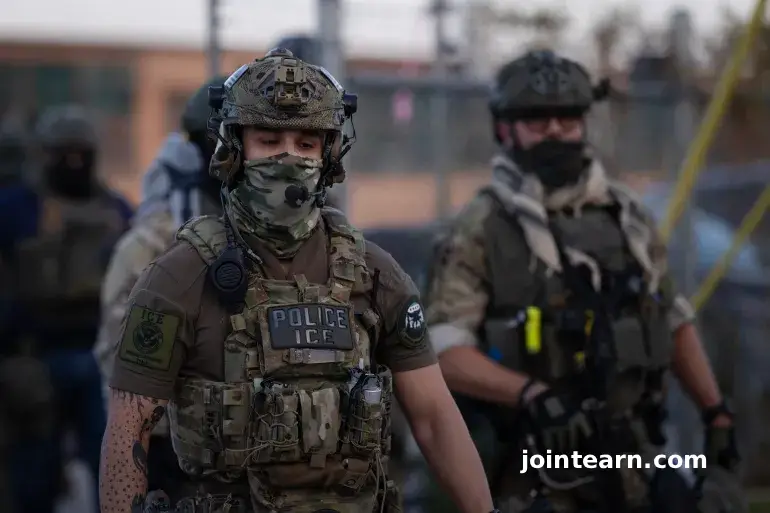
Immigrants File Class-Action Lawsuit Over Conditions at Broadview ICE Facility
Two immigrants detained in Chicago, Illinois, have filed a class-action lawsuit against senior officials at the U.S. Department of Homeland Security (DHS), alleging that detainees at the Broadview ICE facility have been subjected to inhumane, unsafe, and unlawful conditions while being denied access to legal counsel.
The lawsuit, announced by the American Civil Liberties Union (ACLU) on Friday, highlights the deteriorating situation at the facility amid an aggressive immigration crackdown under President Donald Trump.
“Everyone, no matter their legal status, has the right to access counsel and to not be subject to horrific and inhumane conditions,” said Alexa Van Brunt, director of the MacArthur Justice Center’s Illinois office and lead counsel on the case. “Community members are being kidnapped off the streets, packed in hold cells, denied food, medical care, and basic necessities, and forced to sign away their legal rights.”
Plaintiffs and Allegations
The plaintiffs, Pablo Moreno Gonzalez and Felipe Agustin Zamacona, are long-term Mexican residents of the U.S. who have been detained at Broadview. The lawsuit names top officials, including Homeland Security Secretary Kristi Noem and ICE Director Todd Lyons, as defendants.
The complaint details overcrowding, unsanitary conditions, and neglect at the facility. It describes detainees being forced to stand in cramped holding cells, isolation rooms designed for one person housing up to eight, overflowing toilets, infestations of cockroaches and centipedes, and exposure to bodily fluids.
The plaintiffs allege that detainees have been denied proper food, water, hygiene, and medical care, and that access to phones or legal counsel is extremely limited or monitored, violating fundamental rights.
Operation Midway Blitz and Increased Detention
Conditions at Broadview have worsened following the launch of Operation Midway Blitz on September 8, 2025, a Trump administration initiative aimed at increasing immigration arrests in the Chicago area. According to the lawsuit, this surge has placed immense strain on the facility, originally intended for short-term holding, turning it into a warehousing site for days at a time.
ICE data cited in the suit indicates that 5,202 people were detained at Broadview between January and July 2025, with at least 200 detainees present at any given time.
Denial of Legal and Congressional Access
The complaint also alleges that lawyers, religious representatives, and members of Congress have been denied entry into the facility. While detainees can occasionally use phones to contact legal counsel or family, conversations are monitored, and some are denied outside communication entirely.
“Access to counsel is not a privilege. It is a right,” said Nate Eimer, co-counsel on the lawsuit. “We can debate immigration policy, but there is no debating the denial of legal rights and holding those detained in conditions that are not only unlawful but inhumane.”
National Attention and Controversy
The lawsuit follows similar complaints filed in other states, including New York City’s 26 Federal Plaza facility. Reports of abuse and overcrowding have intensified scrutiny of Trump-era immigration policies, particularly those involving aggressive enforcement tactics by armed and masked ICE agents.
Incidents during Operation Midway Blitz, including the use of tear gas near public events like a neighborhood Halloween parade, have sparked widespread concern over the operation’s brutality and disregard for public safety.
The Trump administration has consistently denied allegations of abuse at ICE facilities, but advocates argue that conditions at Broadview reflect a broader pattern of systemic mistreatment and human rights violations.
Implications for Immigrant Rights
The lawsuit highlights urgent questions about detainee rights, legal access, and humane treatment in U.S. immigration facilities. As immigration enforcement operations continue nationwide, advocates stress the need for independent oversight and accountability to prevent further violations of federal and international law.


Leave a Reply